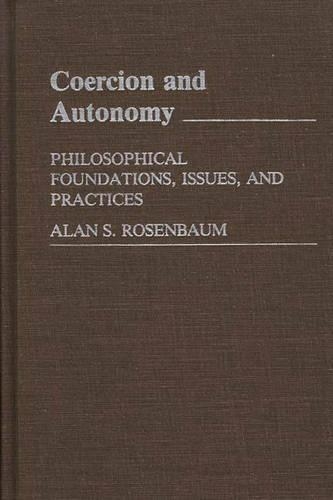
Coercion and Autonomy: Philosophical Foundations, Issues, and Practices
(Hardback)
Publishing Details
Coercion and Autonomy: Philosophical Foundations, Issues, and Practices
By (Author) Allen Rosenbaum
Bloomsbury Publishing PLC
Praeger Publishers Inc
8th October 1986
United States
Classifications
Tertiary Education
Non Fiction
Social and political philosophy
303.36
Physical Properties
Hardback
208
Description
Few subjects in contemporary philosophical and political debate are more cloaked in ambiguity than the issue of coercion -- whether on an individual or global scale or in areas as diverse as family relations, employment, and international finance. In this first full-length treatment of the topic, Professor Rosenbaum carefully reviews previous thinking on this question and develops a persuasive original theory focusing on the conceptual relationship between human social autonomy and coercion.
Reviews
Rosenbaum gives us a penetrating analysis of coercion that includes discussions of various theories of this philosophical notion. His thesis is that coercion is a relational and dynamic concept that is definable mainly with respect to relative and shifting spheres of autonomy.' After discussing coercion from an empirical point of view, the author proceeds to examine subjective (role and intersubjectivity) factors in this concept. He finds some definitions wanting since the social roles of the participants are neglected. As Rosenbaum sees it, the various changing roles between the participants often affect the nature of the relationships and their degree of coerciveness. He uses the Cuban missile crisis as an example, demonstrating Kruschchev's loss of social autonomy. It is the infringement upon social autonomy that is objectionable about coercion. Excellent and copious notes. Appropriate for advanced undergraduates and graduate students in philosophy and allied fields of sociology, social psychology, and political science.-Choice
"Rosenbaum gives us a penetrating analysis of coercion that includes discussions of various theories of this philosophical notion. His thesis is that coercion is a relational and dynamic concept that is definable mainly with respect to relative and shifting spheres of autonomy.' After discussing coercion from an empirical point of view, the author proceeds to examine subjective (role and intersubjectivity) factors in this concept. He finds some definitions wanting since the social roles of the participants are neglected. As Rosenbaum sees it, the various changing roles between the participants often affect the nature of the relationships and their degree of coerciveness. He uses the Cuban missile crisis as an example, demonstrating Kruschchev's loss of social autonomy. It is the infringement upon social autonomy that is objectionable about coercion. Excellent and copious notes. Appropriate for advanced undergraduates and graduate students in philosophy and allied fields of sociology, social psychology, and political science."-Choice
Author Bio
ALAN S. ROSENBAUM is Associate Professor of Philosophy at Cleveland State University.
